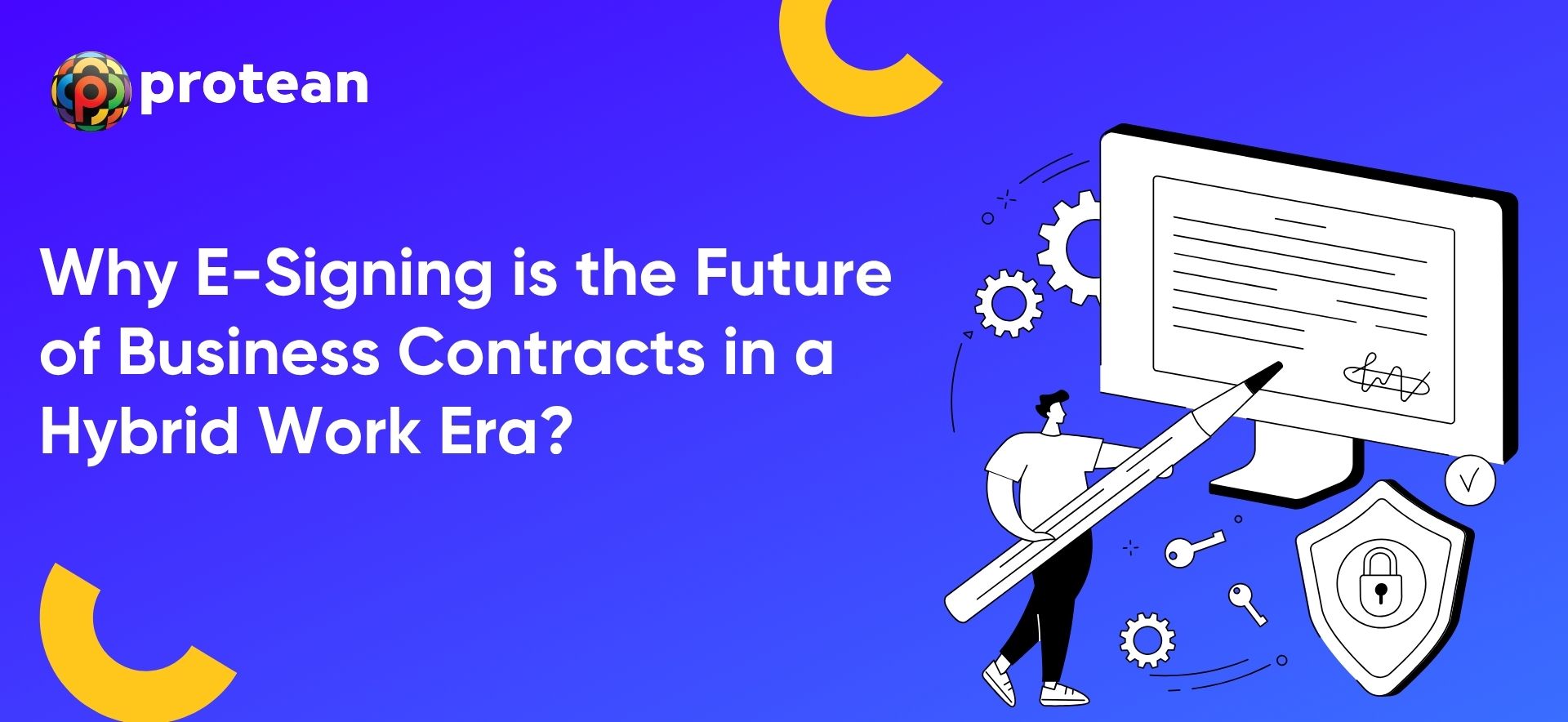Blog
Why E-Signing is the Future of Business Contracts in a Hybrid Work Era?
In today’s business world, speed and efficiency often decide who moves ahead and who lags. With hybrid work becoming the new normal across industries in India, organisations are now rethinking how they manage their paperwork, contracts, and approvals. Traditional ways of signing documents are becoming less practical, especially in workplaces where digital alternatives are being adopted. This is where e signing for business is emerging as a game changer.
Whether your team works from home, the office, or both, digital signatures are making processes faster, safer, and more accessible. Let’s explore why the application e-signing services business is not just a passing trend but a core part of the future of contracts in this hybrid work era.
The Shift from Physical to Digital Contracts
Before hybrid models, most official agreements and business contracts were signed physically. This meant printing documents, scheduling courier pick-ups, chasing signatures, and dealing with filing cabinets full of papers. In a hybrid or remote setup, this system simply does not work efficiently.
What has changed:
- Contracts now need to be accessed and signed from anywhere.
- Teams operate across different cities and time zones.
- There is a growing focus on digital-first processes.
- Businesses are adopting paperless practices for compliance and sustainability.
In this landscape, e-signing for business has become a practical solution for Indian organisations aiming to stay agile.
| Also Read: Digital Property Transactions |
How E-Signing Works in a Business Environment
E-signing uses legally valid electronic signatures to authorise digital documents. For Indian companies, this often includes Aadhaar e-sign authentication, which links an individual’s digital signature to their Aadhaar credentials.
Here’s a quick look at how the process generally works:
- Upload the document to a verified e-sign platform.
- Add signer details (name, email, Aadhaar, etc.)
- The signer receives a link for verification.
- Using OTP-based Aadhaar authentication, the document is signed.
- A secure audit trail is maintained for legal purposes.
Why E-Signing Aligns with Hybrid Work Models
In a hybrid setup, flexibility is key. E-signature tools offer that flexibility without compromising on speed or security. Here’s why they make so much sense:
1. Access Anytime, Anywhere
- Sign documents remotely without being physically present.
- Ideal for teams working from different locations.
- Ensures operations don’t stall due to delays in manual sign-offs.
2. Faster Turnaround Times
- Speed up internal approvals and contract closures.
- Reduce dependency on physical documentation.
- Easily track pending signatures and follow up as needed.
3. Enhanced Security and Compliance
- Most application e-signing services business tools come with encryption.
- Documents cannot be altered post-signature.
- Audit logs provide transparency and accountability.
4. Cost and Resource Efficiency
- Save on printing, courier, and storage expenses.
- Reduce the load on the admin and legal teams.
- No need for physical archiving or paperwork maintenance.
| Also Read: eSignature advantages |
Real-World Applications Across Industries
Indian businesses across different sectors are actively integrating e-signing for business. Some everyday use cases include:
- HR departments are signing offer letters, contracts, and onboarding documents.
- Legal teams manage vendor agreements and NDAs.
- Finance teams approve internal authorisations and external agreements.
- Sales teams are finalising deals quickly with digitally signed contracts.
- Startups and MSMEs using Aadhaar e sign to streamline their compliance
These solutions are constructive for businesses in Tier 2 and Tier 3 cities, where physical document handling might be slower due to logistical challenges.
Choosing the Right E-Signing Solution
When considering an application e-signing services business tool, look for:
- Aadhaar-based e-sign capability
- End-to-end encryption
- Simple user interface with mobile-friendly access
- Integration options with your existing CRM or HRMS
- Validity under the Information Technology Act, 2000
Aadhaar eSign: A Secure and Scalable Solution
In India, Aadhaar eSign has made e-signatures more accessible to individuals and businesses alike. It provides:
- Legally recognised signature linked to an individual’s Aadhaar
- Secure OTP verification to confirm identity
- Real-time authorisation without needing physical presence
With government backing and wide acceptability, Aadhaar-based e-signatures are a dependable solution for scaling business operations digitally.
| Also Read: boost efficiency with eSign |
Conclusion
As hybrid work becomes a core part of Indian business culture, traditional contract signing methods are gradually being replaced. The growing demand for speed, security, and remote access has made e-signing essential for modern workflows. Whether you run a startup or a large enterprise, digital solutions with Aadhaar-based signing offer a smarter way forward. Platforms like Protean eSign Pro simplify this transition, offering compliant and scalable e-signature services tailored for Indian businesses.
Frequently Asked Questions
1. Is e-signing legally valid for business contracts in India?
Yes, e-signatures are legally recognised under the Information Technology Act, 2000. Solutions that offer Aadhaar eSign are widely accepted for both individual and business use, making them a secure choice for executing contracts digitally.
2. What are the key benefits of using application e-signing services for business?
Some of the main benefits include faster contract turnaround, reduced paperwork, enhanced document security, and remote accessibility. These tools are efficient for hybrid work environments, where teams may not always be in the same location.
3. Can Aadhaar e sign be used for signing employment or vendor agreements?
Absolutely. Aadhaar e sign is commonly used for signing offer letters, vendor contracts, partnership documents, and other business-related paperwork. It ensures identity verification through OTP and provides a legally binding digital signature.
4. How secure is e-signing for sensitive business documents?
Most professional e-signing platforms use encryption and secure authentication protocols. A complete audit trail is also generated, which helps maintain compliance and traceability for every document signed.
5. Do small businesses in India also benefit from adopting e-signature solutions?
Yes, small and medium-sized businesses can significantly benefit. E-signing for business reduces operational delays and eliminates the cost of printing and courier services. It also helps standardise workflows across teams working remotely or across cities.



